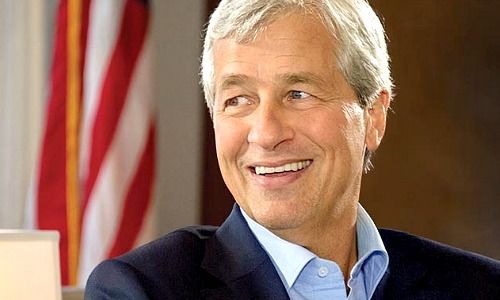J.P. Morgan's Jamie Dimon: There's Work to Do in China
When one of the most influential bankers on Wall Street is looking to invest big, the competition had better take note. For J.P. Morgan head Jamie Dimon, big means China.
Jamie Dimon, one of the Wall-Street-CEO veterans along with Lloyd Blankfein from Goldman Sachs, is planning to use his five-year extension approved by the J.P. Morgan board well. The 62-year-old, whose wealth is estimated at about $1.3 billion, is going to spend his final years in office at the biggest U.S. bank tackling China.
In one of his rare interviews, he's bubbling with enthusiasm and ambition: «We’re building in China for the next 100 years,» he told «Bloomberg». He meant this quite literally: «One day we’ll build a tower in Beijing like those we have in New York.»
Some Catching Up to Do
The impending trade conflict between the U.S. and China doesn’t seem to concern him in the least. The two sides need to make progress in understanding each other, Dimon said of the current dispute between the world’s two economic superpowers. «We need progress.» This message ought to be heeded at the White House in Washington: the J.P.Morgan CEO is well known for speaking his mind with U.S. President Donald Trump.
Dimon would rather focus on the catch-up race in Asia. The Chinese authorities recently allowed foreign companies to take a majority stake in joint ventures in the country. UBS has already reacted and applied to expand its holding in such a deal. Together with domestic rival Credit Suisse, the two big Swiss banks occupy the number one and three spots in the Asian asset management rankings. J.P. Morgan isn’t even in the top ten, although it is a big player in brokerage and investment banking.
As a matter of urgency, Dimon wants to submit an application just like UBS. The eventual aim is to offer a service package for China, similar to the one in the U.S. Profit plays a secondary role at the moment. «I am not worried about short-term yields or profits in China at the moment,» Dimon notes.
Born Optimist
Dimon, who recovered recently from cancer and is well known for his unrelenting optimism, isn’t that bullish on the outlook for the world beyond Asia. The rising level of debt of the U.S. and the flooding of the bond market could lead to more volatility in the markets, which concerns him. For investors a normalization of monetary policy in the West would have as much novelty value as quantitative easing.
This understatement harks back to an interview given to the German news magazine «Der Spiegel» in 2007, just prior to the financial crisis. «The situation in the financial markets is worse than many people realize, but the dimensions for a recession haven’t yet been reached.»



























